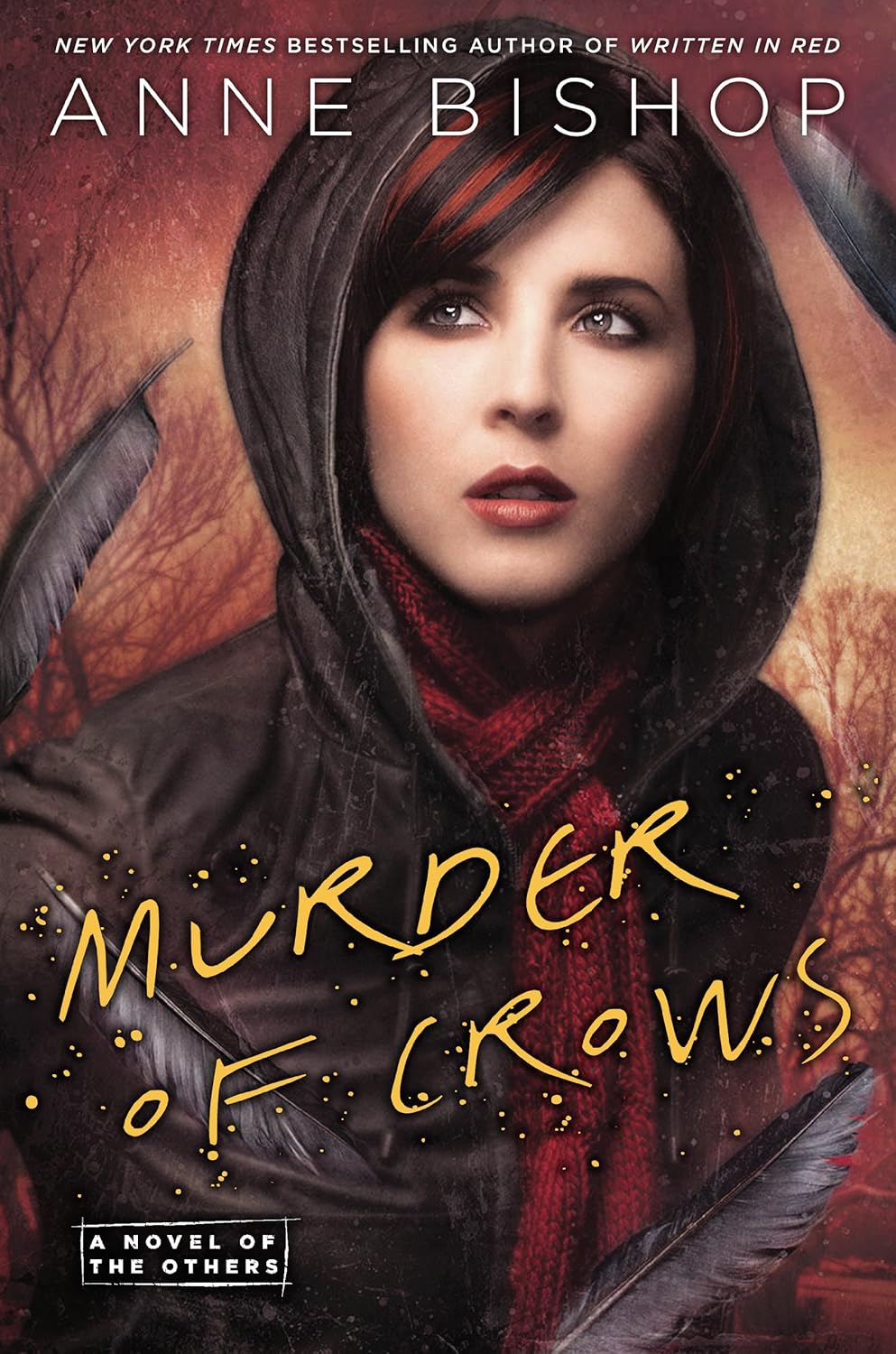Murder of Crows is the sequel to Written in Red--reviewed here. Published in March of this year, this book is only available digitally or in hardcover--for a whopping $26.95, I should mention. I downloaded a digital copy to tide me over until a paperback copy is available.
The start of this novel is not immediate after the end of the previous, although the temporal distance between them is essentially negligible. Things in the human spaces are tense, and "gone over wolf"--the drug unveiled in Written in Red--is making its way around Thaisia.
Humans are baiting the Crows by putting shinies into trash cans on collection day and then poisoning food with GOW: attempted mass murder proceeds. Why Crows? Because they see everything and communicate with their crow counterparts: to put it simply, they know too much.
Although I am thoroughly enjoying Murder of Crows, I do have to admit that it doesn't start out--by which I mean the first 20-some chapters--at quite the same level of intensity. The main drama takes place outside of Lakeside--and in a different region, though growing ever-closer--and the body of what's taking place in Lakeside Courtyard is relationship drama between Meg and Simon. And we all saw that coming. The shoulders over which we're peeking are frequently new to us, the names being dropped are not familiar ones--and while this can feel random to the unseasoned, perhaps unprepared reader, it provides one with a set of puzzle pieces illuminating different areas on a multi-faceted situation--because this thing is bigger than a puzzle, and more complicated than a sphere; it has edges that can't be seen around and thus require a new shoulder to illuminate this plane. I hope you're following.
All the cassandra sangue are prophesying the same thing, regardless of the questions asked, and even the euphoria can't mask the resulting terror/horror. Intuits--a breed of humans with terra indigene-like instincts--are sensing storms that have nothing to do with the weather. "Humans First and Last" is unfortunately gaining traction. Humans in Cel-Romano are building "flying machines." The terra indigene have evicted an entire hamlet for their crimes against the Crows. In essence: Shit's about to go down.
As the novel progresses, it becomes clear that Bishop is placing the reader in a very precarious moral, or ethical, debate: whose side are you on? Are you more sympathetic of the humans and their effort to gain more control over the world in which they're trying to live? Or are you more sympathetic to the Others, whose concern for the world outweighs their interest in the production of goods/services and the use for humans? While reading these novels, I am, of course, provided with the perspectives from both sides, and so I can sympathize with both humans and terra indigene. But am I supposed to sympathize with humans more because I am one, although am obviously living without the existence of a being higher up on my food chain? And if I am, what does it say if/that I'm not on the side of the humans? What does it say about me that I can ethically/morally/psychologically rationalize the motions of the terra indigene and their feelings? I don't know at this point, but it's an interesting question, and it's one that won't really leave me alone. I think that's kind of the point.
This isn't the only issue readers face: in dealing with the cassandra sangue, Namid's wondrous and terrible creation, was it ethical to allow for benevolent ownership? Was it ethical for these girls to be 'owned' and essentially have their lives run as if they were prison inmates? Considering the self-destruction they caused if left to their own devices, was it ethical to let them exist on their own, without guardianship?
While the issue is hardly literally relevant to society, it may be metaphorically ethical when thinking about other things or situations. Currently none come to mind, but I will own the blame for being largely ignorant of current affairs around the globe. With a little thought--and perhaps some extrapolation--I'm sure the ethical question can be overlaid like a projection transparency* upon certain situations.
Murder of Crows was significantly shorter than Written in Red, coming in at 35 chapters and 354 pages--please don't ask me to drop the chapter and page count of the first novel, but it at least felt like at least half again that long, if not twice. Consequently, I had it read in a very, very short amount of time--I bought it yesterday afternoon and finished it about an hour ago**--and I have to admit that I'm kind of disappointed in its length. The ending is good, is concise, but I'm fairly certain leading toward at least one more. It's hard to say with Bishop, but she isn't known for producing short series, so odds are good. Which works in my favor. (=
Until next time,
--Emily
*Did I just date myself by referencing that technology? I'm not even that old! The technology that we had in my school growing up was pretty old because we were a small school with few students (I graduated with a mere*** 21 other kids) and so we didn't get all that much funding. Granted; I started school before 2000, so it's not like other places had SmartBoards and we didn't. But still.
**And I went out bar-hopping with my boyfriend and some friends last night, and spent a long time sleeping to avoid a hangover.
***This is a personal note, and therefore completely irrelevant, but I want to share it anyway. I can't write "mere" without giggling to myself anymore, because my boyfriend and I have shortened "Come here --> C'mere" to simply "mere" whenever we want the other to be less lazy and come provide kisses or snuggles or whatever.

No comments:
Post a Comment
Let me know what you think!